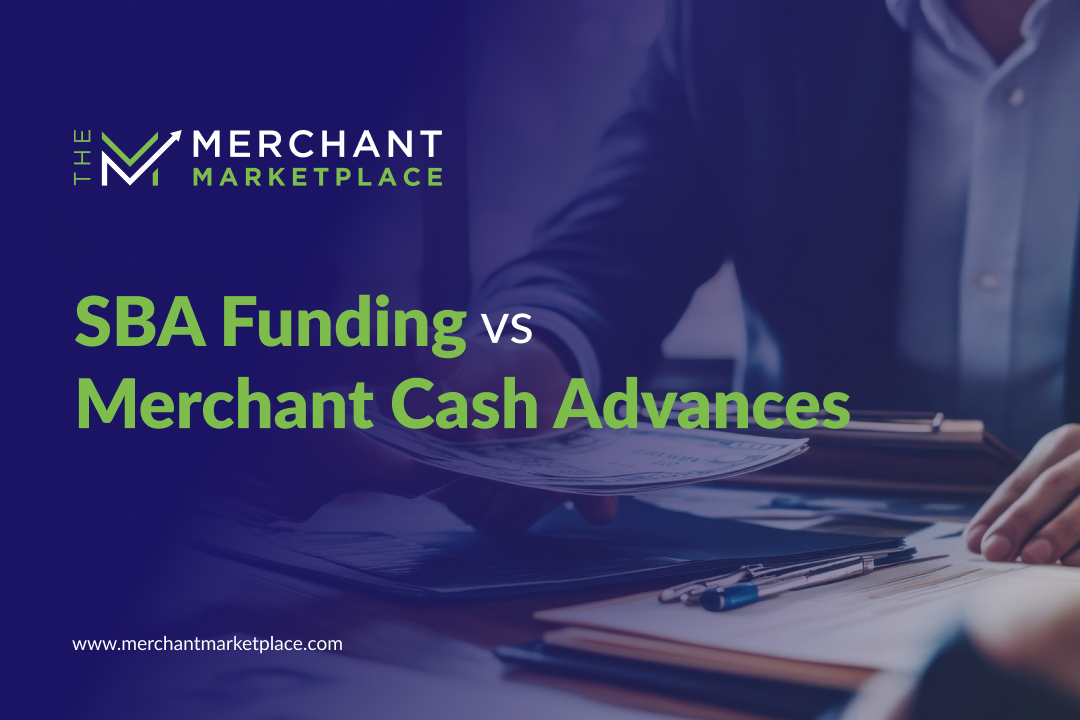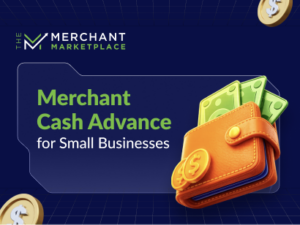Small businesses often hit a wall when they need cash. One week you’re flush, the next you’re scrambling to cover payroll or stock shelves. That’s when the money crunch hits hardest. And here’s the kicker: it’s not just about grabbing cash fast, it’s about landing the right kind of cash, the kind that keeps your business moving forward without strangling your future.
That’s why choosing the right financing option matters. Money isn’t just math on a balance sheet; it’s about lining up the funding with your rhythm, your appetite for risk, and the path you want for your business.
Two of the go-to choices for small business owners chasing extra capital are SBA loans and Merchant Cash Advances (MCAs). They look kind of similar, money now, repay later. But the differences can hit hard. This blog will walk you through what each is, what’s their strengths and risks are, and how to pick which works best for you.
SBA Loans vs Merchant Cash Advances
SBA loans and Merchant Cash Advances (MCAs) both provide funding, but they work very differently. SBA loans are government-backed, offer lower interest rates, larger amounts, and long repayment terms—ideal for established businesses planning long-term growth. However, they require strong credit, extensive paperwork, and take weeks or months to fund. MCAs, on the other hand, provide fast cash within days and have flexible repayments tied to daily sales, making them suitable for urgent short-term needs. But they’re costly, with high fees and quick repayment cycles. Choosing between them depends on your urgency, credit strength, and business goals.
What is an SBA Loan?
“SBA” stands for Small Business Administration in the U.S. ; it’s a government agency that doesn’t usually lend directly, but guarantees loans made by banks and approved lenders. The idea is to help small businesses that don’t quite meet the risk threshold of a regular bank loan or need better terms than the open market offers.
How SBA Loans Work
- A bank or lender issues the loan, but the SBA steps in to guarantee part of it. That lowers risk for the lender, which lets them offer more favorable terms to you
- There are approved lenders, certified programs, and oversight. You’ll interact with banks or credit unions, or nonbank SBA lenders
- Different SBA programs (like 7(a), 504, and microloans) have different uses, caps, and rules. Some are for fixed assets, some for working capital.
Typical Features
- Interest rates are usually lower than many alternative finance options. Because of the government guarantee, lenders don’t need to charge as much of a premium for risk.
- Repayment terms are longer, years rather than months. You might stretch out repayment over 10-25 years, especially if real estate or big fixed assets are involved.
- Some require collateral or guarantees. Depends on how big the loan is, what it’s for, and how risky your business profile is.
Eligibility Requirements and Documentation
- You’ll need a good credit history and stable financials (revenues, profits, cash flow). Some SBA programs demand you show that you’ve tried to get financing elsewhere.
- Documentation galore: business plan, financial statements, tax returns, projections, possibly personal financial info
- Must be a for-profit operating business, often located in the U.S., meet “small business” size standards.
What is a Merchant Cash Advance (MCA)?
A Merchant Cash Advance is not exactly a loan in strict legal terms, but rather an advance on future sales. You get a lump sum now and repay via a slice of your future credit/debit card sales (or sometimes overall sales) until you repay the advance and a fee.
It’s meant for short-term cash flow problems, emergencies, or opportunities you need to grab fast.
How MCAs Work
- You agree with a provider to get cash now. In return, you basically hand over a piece of your future daily or weekly credit/debit card receipts (or some agreed percentage of your sales)
- There’s a factor rate, not quite “interest rate,” but a similar idea. Like you might agree that for every $1 you get now, you’ll pay back $1.2 or more, depending on risk, sales patterns and provider
- The repayment amount fluctuates with your sales: more sales, you pay more; slow days, payments drop. But often there’s a minimum “take” percentage (holdback) the provider takes.
Typical Features
- Fast funding: Many MCAs can be approved and funded in 1-2 days. That speed is one of their big draws
- Flexible repayment tied to sales: If sales drop, your payments drop, so it adjusts somewhat with business flow
- Minimal documentation / looser credit requirements: Because providers often care more about your sales volume than your credit score or long history.
Requirements for Approval
- You’ll usually need consistent credit/debit card sales or predictable receivables. The provider wants to know if you bring in revenue
- Basic business info, maybe bank statements, sales history. Not as deep financials as SBA
- Sometimes personal guarantee or a business must meet certain track records, but often far more forgiving than SBA loans.
SBA Loans vs. Merchant Cash Advances: Key Differences
| Feature |
SBA Loans | Merchant Cash Advances |
| Approval Process |
Lengthy, paperwork-heavy, credit checks, collateral; can take weeks or months | Fast, minimal paperwork, funding in 1–2 days |
| Cost | Lower interest, predictable fees | High factor rates, expensive, sometimes triple-digit APR |
| Repayment Terms |
Fixed monthly payments over years | Daily/weekly payments tied to sales, short-term |
| Eligibility | Strict: solid credit, financials, collateral often required |
Flexible: sales volume matters more than credit |
| Funding Size | Larger sums, up to $5M+ for big projects | Smaller, short-term amounts for immediate needs |
SBA Loans vs MCAs: Pros & Cons
Pros & Cons of SBA Loans
Pros
- Affordable rates: Lower interest, lower fees, because the government guarantee reduces lender risk. Big plus for cash flow.
- Higher funding amounts: If you need a large sum (real estate, major equipment, expansion), SBA is probably the route.
- Longer repayment time: Terms can be generous, 10-25 years for certain kinds of projects. That keeps payments manageable.
Cons
- Approval process is tough and slow: Lots of paperwork, long waits. Bureaucracy involved. Might not work well if you need money yesterday
- Strict eligibility requirements: Credit checks, history, proof of consistent revenue, and sometimes collateral. That excludes many startups or businesses with shaky books
- Slow funding: Even after approval, the disbursement can take time. Not ideal for urgent cash needs.
Pros & Cons of Merchant Cash Advances
Pros
- Fast funding: If you need cash now like for emergency payroll, urgent repairs, or to seize an opportunity, MCAs are among the quickest options.
- Flexible repayment tied to sales: If a business slows, payments drop; when business picks up, you pay more. It rides your business cycle.
- Minimal documentation: Less red tape, often easier qualification, especially if credit isn’t perfect.
Cons
- Expensive: Factor rates + fees can make the cost really steep; APRs are often much higher than traditional loans.
- Short-term burden: Repayment is aggressive, often daily or weekly, taking a chunk of your sales. That can squeeze cash flow.
- Risk of cash flow shock: Because payments are tied to revenue, sudden drops or seasonality can make things tight. Also, cost + frequent payments can create a debt cycle.
Which is Better for Small Businesses?
There’s no one-size-fits-all. It comes down to what your business is doing, where you are, and what you need now vs later.
SBA Loans are better for:
Established businesses with good credit history and stable revenue. Those looking for long-term growth: buying property, building, big equipment, expansion. Owners willing to go through paperwork, waiting period, but who want lower cost of capital over time.
MCAs are better for:
Businesses with urgent cash needs: emergency fixups, payroll gaps, quick inventory restock. Those with limited credit or a thin financial history, but good daily/weekly sales volume. Situations where speed trumps cost, and you accept higher cost in exchange for immediacy.
Use Case Examples
Suppose a restaurant wants to expand to a second location, buy land, renovate, and plan for 20+ years. An SBA 504 or 7(a) makes sense: large amount, predictable repayments, structured plan.
On the other hand, imagine the same restaurant’s oven breaks down in the middle of summer, or a supplier delays delivery, and you need cash to cover payroll, an MCA might be the move to keep things running until the bigger plan kicks in.
Alternative Funding Options to Consider
While SBA loans and MCAs are big players, there are other funding tools that might make more sense in some situations. Mixing or picking the right one can be the smart play.
Business Lines of Credit: More flexible, you use what you need, pay interest only on what you draw. Good for seasonal or unpredictable cash flow.
Equipment Financing: If your need is specifically for equipment, you use the equipment as collateral and pay over time. It Can be cheaper than MCAs if done well.
Invoice Factoring: You sell your unpaid invoices to a factor for immediate cash. Good if you have lots of receivables, waiting on payments. But factor fees add up.
Term Loans: Traditional bank or online lender loans with fixed terms. Somewhere between SBA and MCA in cost/time. If you qualify, they can be decent middle ground.
Conclusion
SBA Loans and Merchant Cash Advances both solve the cash problem, but they do it very differently. SBA loans offer lower cost, more structure, and larger sums over longer timeframes. MCAs give you speed, flexibility, and fewer barriers, but at a premium.
At the end of the day, pick based on business goals: how soon you need money, how strong your cash flow is, how tolerant you are of cost, and how important lower payments or slower repayment is. Matching the funding vehicle to your long-term vision matters more than grabbing the first cash that shows up.
If you’re a small business owner wondering which route fits you better, Merchant Marketplace can help you cut through the jargon. Explore your funding options today.




